CRM vs. marketing automation: Which one is right for your business?
Discover the differences between CRM and marketing automation, and determine which one is best for your business needs, with our comprehensive guide.


Running a small business can feel like juggling a hundred things at once. You’re working hard to grow your brand, connect with customers, and manage day-to-day tasks—sometimes all at the same time.
It’s no wonder things like managing email campaigns, segmenting audiences, and tracking leads can feel overwhelming. That’s where marketing automation tools come in.
These tools handle the repetitive, time-consuming tasks for you—like sending follow-up emails or organizing customer data—so you can focus on the things that drive your business forward, like building stronger relationships with your customers and thinking up creative strategies.
But marketing automation isn’t just about saving time. It also gives you valuable insights and helps your team stay organized, so your marketing efforts are more effective.
In this article, we’ll break down what marketing automation is, its key benefits, and share 10 tools that can help you grow your small business.
Let’s get started!
Marketing automation uses software to manage repetitive marketing tasks, especially those related to communication like email, SMS, and social media.
With a marketing automation tool, you can save time by automating workflows and focus on bigger tasks that drive growth.
These platforms don't just automate tasks, they also help with campaign management, lead tracking, analytics, and reporting.
Plus, they allow you to create workflows, which are rules that trigger actions based on customer behavior.
Automating your marketing allows you to spend more time on creative and strategic work while minimizing errors.
According to the Annuitas Group, companies that use marketing automation tools for lead nurturing have an increase of 451% in qualified leads.
However, this is just the tip of the iceberg. Let's look at the numerous other reasons why it's so beneficial to implement marketing automation for small business.
Effective campaigns rely on strong teamwork. Without a system to keep everyone aligned, collaboration can become chaotic.
A reliable marketing automation platform provides a clear view of workflows, leads, and sales pipelines, so marketing and sales teams can stay on the same page.
Companies that rely on marketing automation software use their human and financial resources more efficiently.
Automating repetitive tasks allows companies to segment audiences more precisely and allocate resources to the right audience. This reduces the chances of wasting resources on ineffective campaigns.
A marketing automation tool combines several marketing functions in a single platform, streamlining your marketing activities.
So, instead of relying on multiple platforms to handle each aspect of the marketing strategy, small businesses can count on an all-in-one platform to streamline their workflows.
The best marketing automation platforms efficiently collect customer data by tracking email conversations, website visits, social media engagement, and other interactions.
This gives you a comprehensive view of each customer’s journey, allowing you to tailor messages and improve engagement across multiple channels.
Marketing automation platforms allow you to create marketing campaign templates that keep branding consistent in all notifications, emails, SMS, and social media posts.
Automation platforms provide detailed analytics, making it easier to track campaign performance, predict customer behavior, and make data-driven decisions.
This information is crucial for small businesses to measure campaign performance and predict consumer behavior, especially because they usually work with tight budgets that leave virtually no room for mistakes.
The marketing landscape constantly changes due to technological advancements, globalization, and other factors. Businesses need to keep up with these changes and adapt their strategies accordingly.
Marketing automation software helps companies adjust campaigns to market trends, customer behavior, and competitive moves quickly.
With resources like real-time data collection and A/B testing, marketing automation tools help businesses react faster and thrive in the dynamic marketing environment.
Automation tools make it simple to create personalized experiences. By analyzing customer data, you can target the right people with relevant messages, increasing your chances of success.
A marketing automation tool can help you personalize campaigns more efficiently. The best tools usually provide large datasets on customer behavior and preferences that enable audience segmentation.
Most marketing automation platforms can scale with you.
No matter how much your contact list increases, how complex your strategy becomes, or how many people you bring in to the team, a reliable marketing automation platform can effortlessly handle the extra work.
Now that we've highlighted how much time and effort a marketing automation tool can save you, it's time to learn what they can actually do for marketing teams. Let's examine some real-world use cases and examples.
Understanding use cases is essential for you to select the right tools according to your business's strategy and needs.
From triggered emails (like cart abandonment reminders) to managing subscriber lists, automation tools make email marketing more effective.
CRM tools are essential to manage interactions and relationships with customers. A powerful CRM automation helps you streamline lead management and nurturing.
For instance, when a visitor fills out a contact form on your website, CRM automation can automatically add the lead to your database.
Then, according to the potential customer's interests, a personalized email sequence is triggered, so the lead receives personalized content based on their preferences.
Plus, every interaction with the lead is tracked (email opens, product pages visits and clicks, etc.), so you always have updated information about the lead's actions.
Marketing automation tools allow you to streamline interaction across multiple social media platforms. Instead of logging into each account and drafting posts individually, manage all your social media accounts from a single dashboard.
Social media marketing tools often include helpful scheduling options to plan out your content calendar.
It's impossible to improve a marketing campaign without tracking performance numbers. Analytics and reporting automation are among the most crucial resources marketing automation tools offer.
Many marketing automation platforms measure ROI, providing clear insights about your campaign investments. You can also create personalized reports from tailored automation that collects data based on your preferences.
With so much valuable information in your hands, it's easier to create targeted marketing campaigns and understand which strategies work better for your audience.
Content marketing automation tools can save content teams time and help to publish content automatically at ideal times, post it in several channels, and even analyze content success.
KPIs are essential to content marketing teams, and marketing automation tools are also valuable in providing extensive insights about traffic, views, impressions, and engagement.
Some marketing automation tools even offer proofreading resources with improvement suggestions for a more appealing and engaging copy.
Omni-channel marketing automation uses tools and technologies to help businesses run marketing campaigns across various channels. With a unified approach, omni-channel marketing automation integrates email, websites, SMS, social media, mobile apps, and other channels into a single strategy.
Using omni-channel marketing automation to automate and centralize campaign management, businesses can save time and resources. They can manage and run campaigns through several channels without increasing workload.
Let's take a look at how these features work in the real world while performing your daily marketing tasks.
Do you ever have to send the same email to various contacts simultaneously, but all messages need to be personalized according to each recipient? This is a problem that a marketing automation software can easily solve.

For example, Streak integrates into your Gmail account and its mail merge tool allows you to send dozens of personalized emails right from your inbox.
Many marketing automation platforms allow you to create or add lead generation forms to your landing pages. Forms are excellent for collecting specific information about visitors and potential clients.

Many automation tools, like Brevo, allow you to design a form and add it to your landing page. Then, it automatically adds the information collected to your contact lists.
Marketing automation platforms are highly useful to follow up with webinar attendees. Using a marketing tool, you can send thank-you emails, segment leads, and tailor follow-up messages.
For instance, with HubSpot you can easily create a new list for an event, set up a follow-up email sequence, and enroll attendees in that sequence.
By doing so, you can take advantage of a webinar or event to nurture leads and turn them into qualified prospects.
Targeted messages can be sent across multiple channels: an Instagram ad, a targeted email, or an SMS. These messages are sent with pieces of marketing copy to specific subgroups of your audience, based on audience segmentation.
This is another example of how useful a marketing automation platform can be, as most of them provide segmentation and multichannel communication.
Since there are so many marketing automation tools out there, it isn't always easy to choose the one that best suits your team.
So, we've carefully curated the top ten marketing automation software and explained what they are, highlighting each one's best features and pricing.
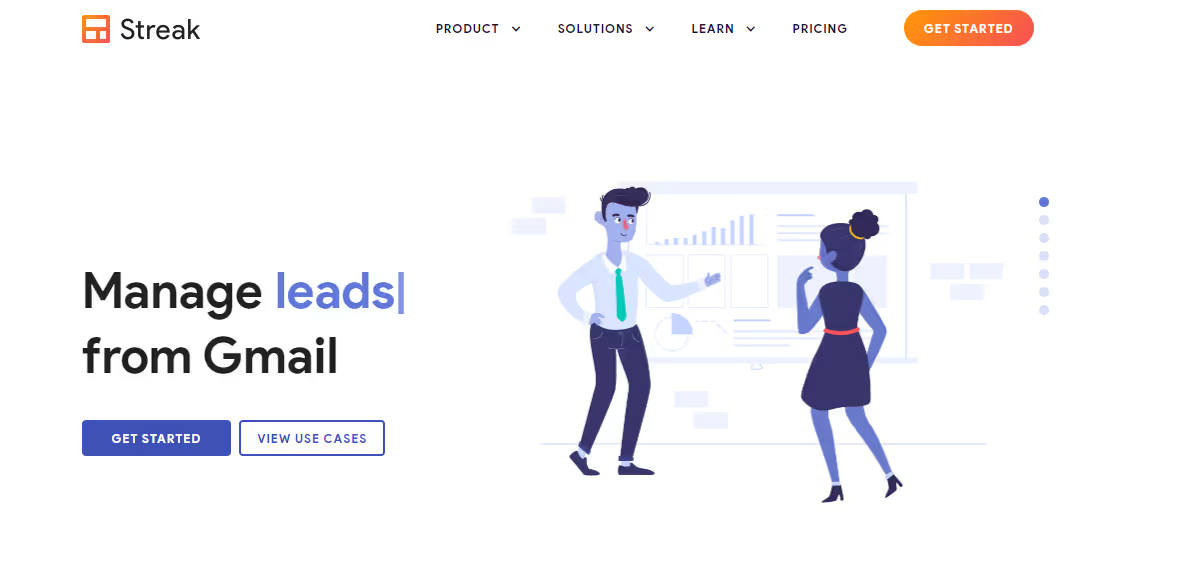
Streak is a CRM and productivity software built into Gmail so that you can manage all your workflows directly from your inbox.
Streak's deep Gmail integration make it a go-to CRM and email automation tool for Gmail-based teams.
Email power tools like Mail Merge, which sends personalized emails in bulk, and Email Tracking, which lets you know when someone has opened your message.
The magic sauce is in the automation tools, which allow you to capture lead data, automate email campaigns, record everything in your CRM in Gmail, and share data across your team for transparency and collaboration.
Streak's prices vary from $0 to $159 per month, depending on your chosen plan and billing cycle. A free plan includes useful features like email tracking, snippets, and up to 50 daily mail merges.
The Pro plan, which costs $49 per user per month billed annually, is the best budget option for small businesses. It adds 1500 mail merges per day and other advanced features not available on a free plan.

Omnisend is a marketing automation software designed especially for ecommerce, but available to all types of businesses.
Omnisend's most valuable features are SMS support, segmentation, email assets, and reporting tools. Several pre-built workflow templates help you track the customer journey, but you can also create your own workflows using its intuitive builder.
There are also customizable email templates, A/B testing, and AI assistance to help write them.
Ominisend has a Free plan that allows users to reach up to 250 contacts and send up to 500 emails per month. This is the perfect plan for starting businesses looking to explore the platform.
Then, there's the Standard plan for $16 per month and the Pro plan for $59 per month. The paid plans increase the monthly number of contacts and emails and add 24/7 customer support.
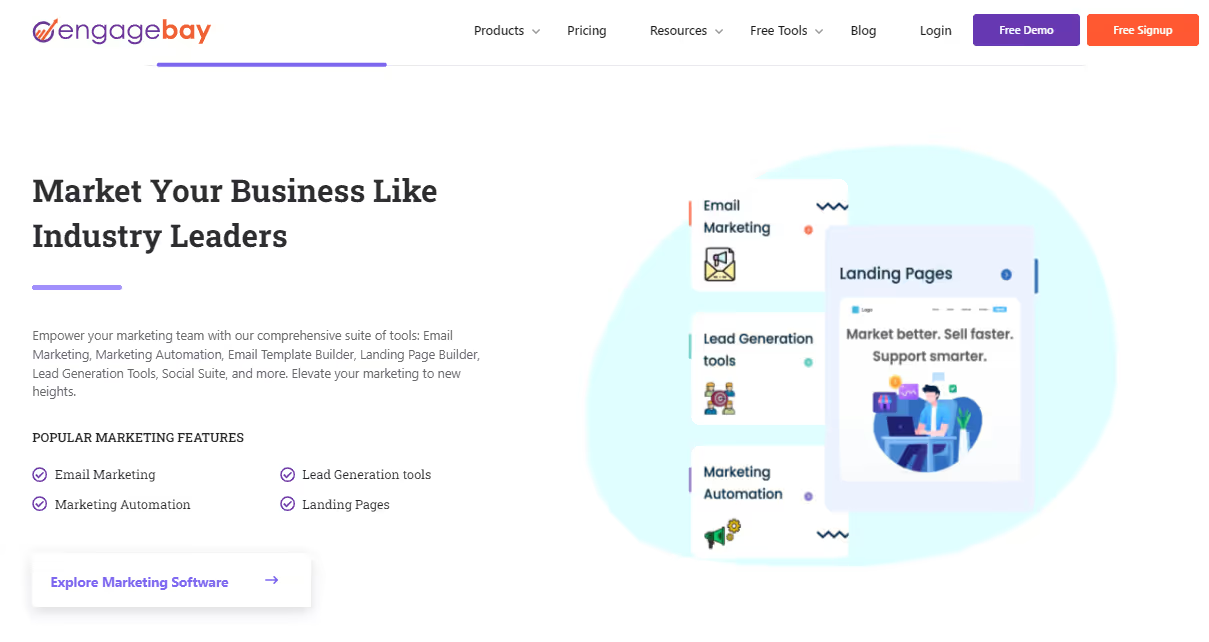
EngageBay gathers marketing, sales, and support in an all-in-one platform specially designed for small to medium-sized businesses.
EngageBay features everything marketing teams could wish for: email marketing, lead generation tools, email template builder, social suite, and much more.
There are also tools to score leads, automate campaigns, and even offer live chat to customers.
There's a free plan with many useful features that starting businesses can take advantage of. The paid plans vary from $12.74 per user per month to $101.99 per user per month. Plus, you can choose between monthly, yearly, or biennial billing cycles.
These prices are for the all-in-one solution, but there are also other plans for those who just need either Marketing or CRM features.

Funnelkit is an all-in-one email marketing platform that helps you create automated campaigns without leaving WordPress.
The tool's best features are the 360-degree contacts overview, pre-built workflows, A/B testing, and in-depth analytics. It also includes a CRM tool that tracks each contact's opens, clicks, and revenue.
Unfortunately, Funnelkit doesn't have a free plan. Prices vary from $99.5 per year to $399.5 per year (there are only annual billing cycles).
Although prices may seem a bit steep at first glance, they are pretty budget-friendly when considering what you pay per month. For instance, the cheapest plan, Basic, only costs $8.3 per month.
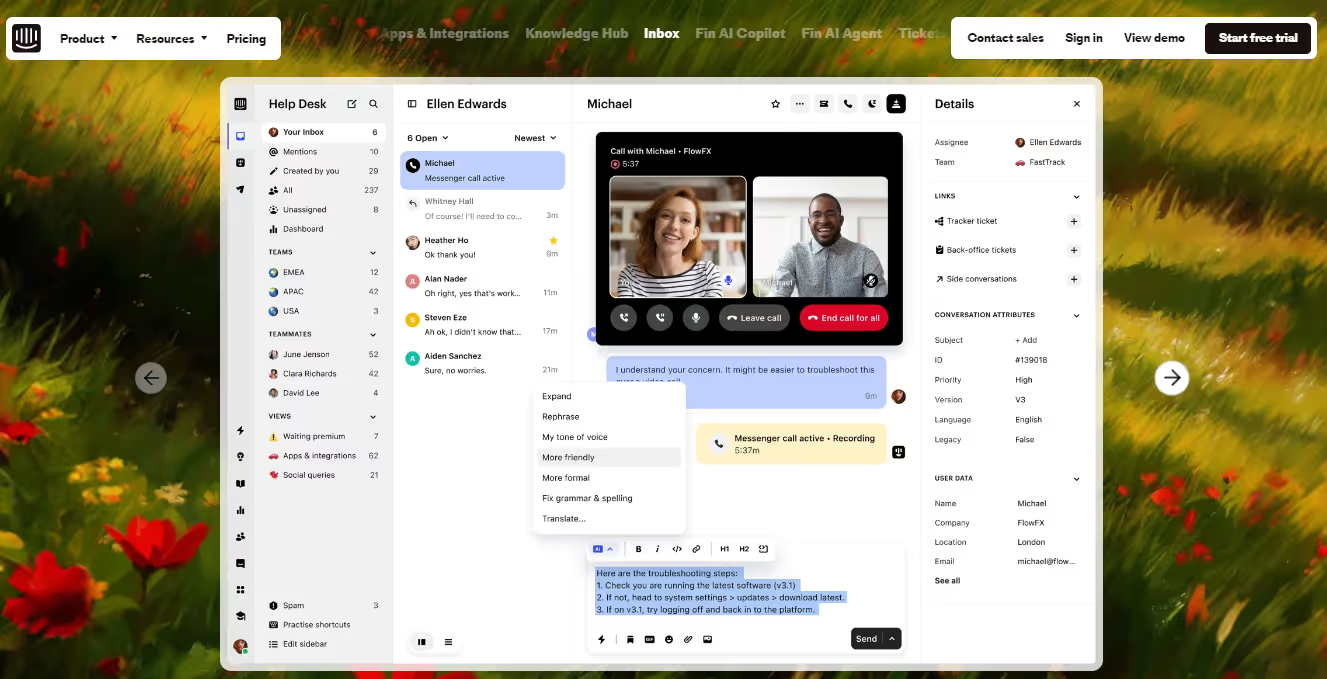
Intercom is a customer service platform. It allows users to offer live chat tool capabilities using chatbots and integrates chats with elements of marketing workflows.
What makes Intercom stand out as a digital marketing automation solution is that users can create automated messages using text, videos, images, and emojis.
Another highlight is the platform's workflow builder, which allows you to customize workflows with drag-and-drop tools to set automated conditions, rules, and triggers.
Intercom's prices start at $29 per month, billed annually, but there are also monthly plans.

HubSpot is marketing automation software that combines marketing, sales, service, operations, and website-building tools all in one platform.
The platform has a user-friendly board for users to craft conditional workflows no matter their level of complexity.
One of the most useful functionalities is the creation and execution of multichannel marketing campaigns. This allows businesses to connect with customers through email, social media, SMS, and other channels.
HubSpot also has a powerful workflow builder and robust analytics for campaign performance.
HubSpot's marketing software has a free plan with popular features like email marketing and forms. However, many teams find that they quickly need to upgrade to get the functionality they need.
The comprehensive marketing software (Marketing Hub Professional) starts at $800 per month, billed annually. It includes three seats, and each additional seat starts at $45 per month.
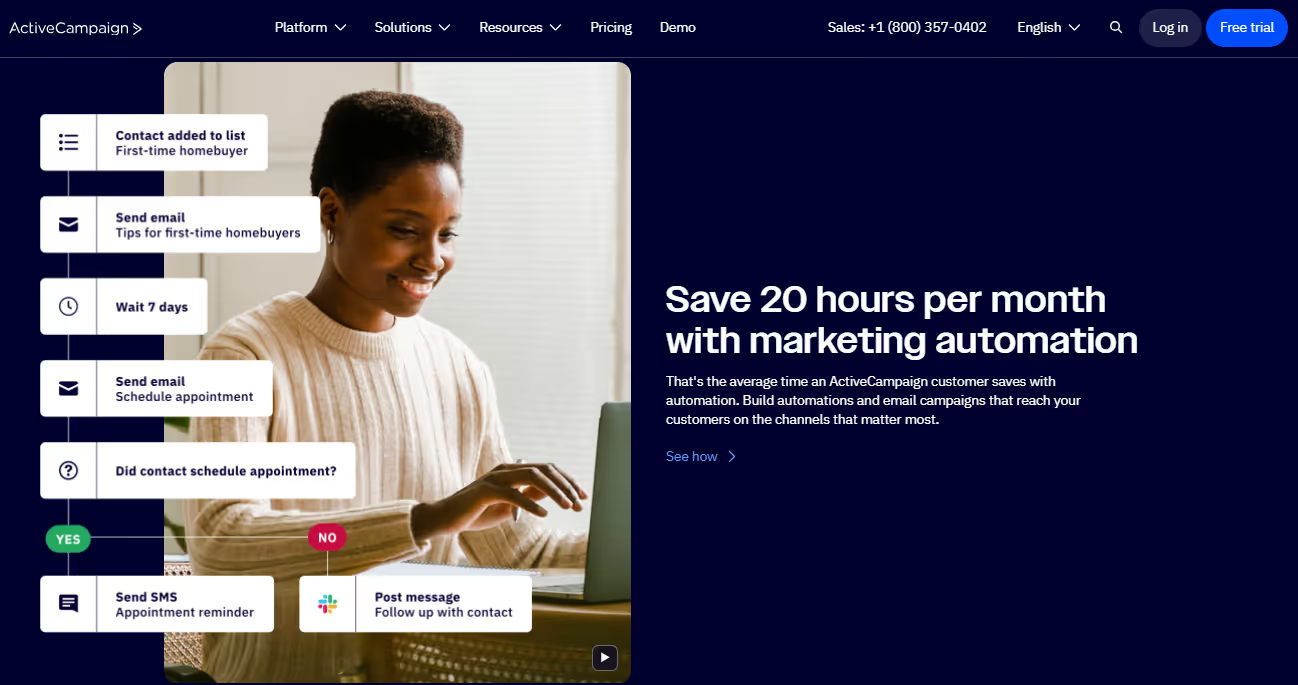
ActiveCampaign is a CRM for small businesses with integrated email marketing and AI-powered automation.
Automation is the core of ActiveCampaign, and through its user-friendly drag-and-drop builder, you can create numerous automation triggers and actions.
There's also audience segmentation and tools to communicate with clients through multiple channels (email, SMS, and social media). Split testing is also available, and Site and Event Tracking provides valuable insights into user behavior.
ActiveCampaign's prices start at $15 per month and go up to $145 per month, depending on the size of your business, how many contacts you have, and which specific marketing automation features your team needs.
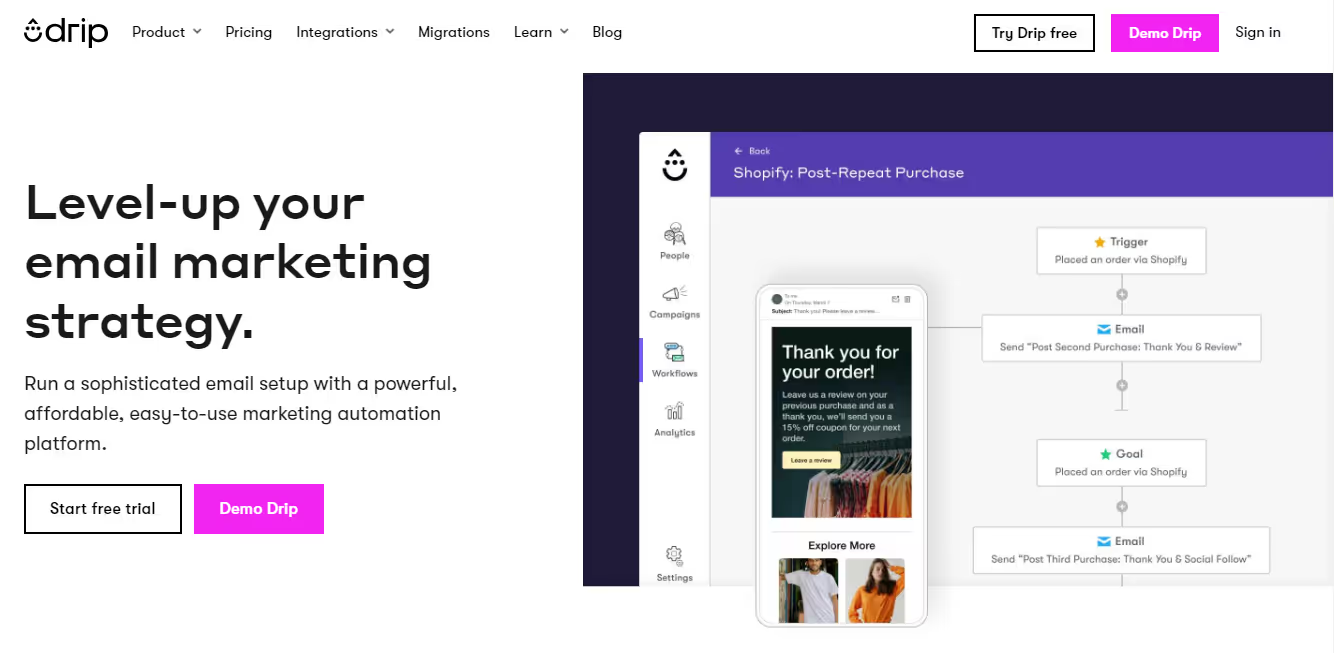
Although Drip is primarily an ecommerce CRM, it has marketing automation tools to enhance email marketing strategy.
Drip allows users to personalize communications and easily customize workflows. Audience segmentation is also available, allowing you to build behavioral and lifecycle segments that are automatically updated.
Drip's prices start at $39 per month, including up to 2,500 contacts and unlimited email sends. The prices go up as the number of people in your email list increases.
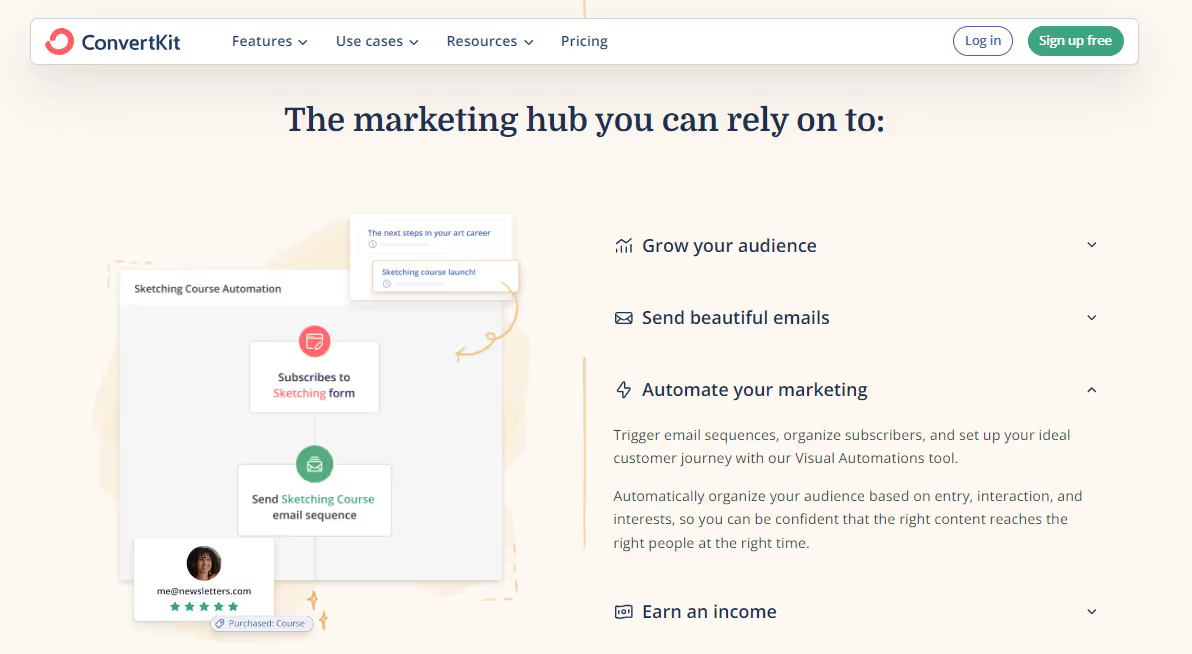
ConvertKit is an email marketing tool specially designed for all types of online creators.
Most of ConverKit's features are related to managing creators' audiences, so there are resources to help increase subscribers with customizable landing pages and sign-up forms.
Other features allow users to trigger email sequences and organize the audience automatically based on entries, interactions, and interests.
Creators building their audience can count on ConvertKit's free plan, which supports up to 10,000 users, but the features available are very limited.
Those who need all the bells and whistles should choose one of the paid plans, starting at $9 per month, billed annually. The prices vary according to the number of subscribers.
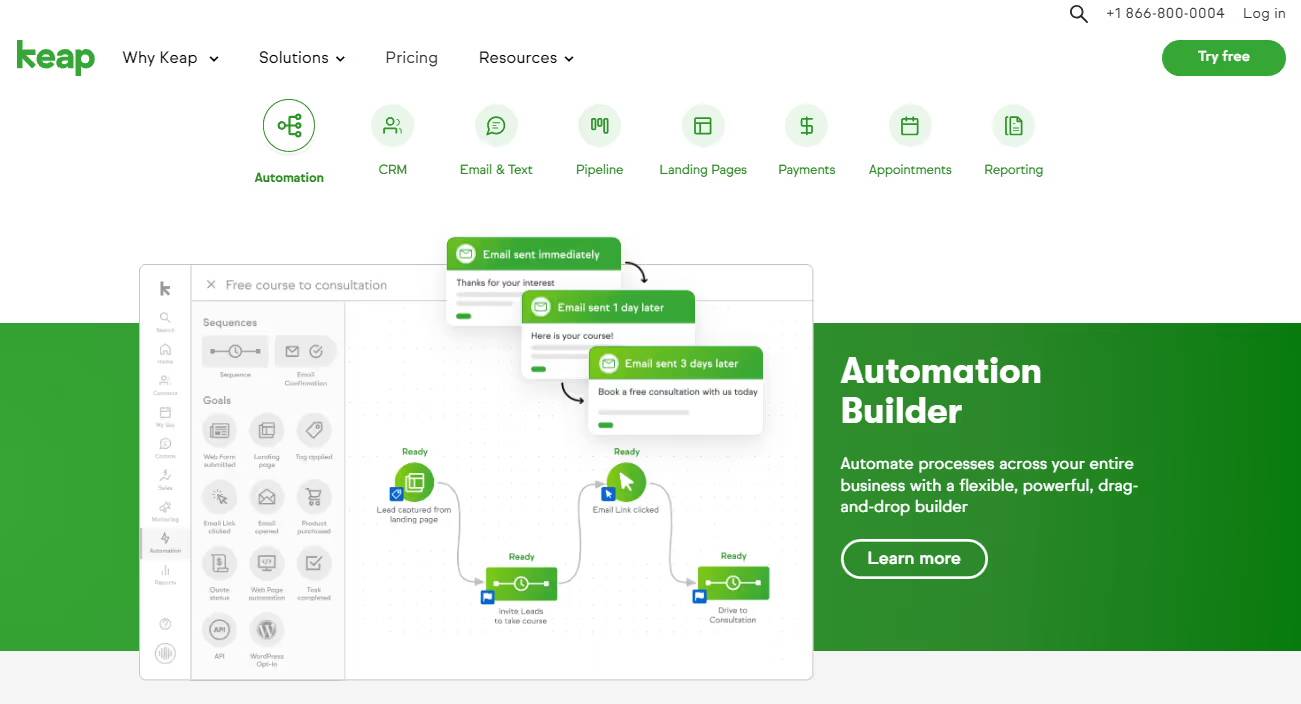
Keap is a CRM with powerful tools to streamline sales and marketing efforts while improving customer relationships.
Keap offers the best marketing automation features: pre-built automation templates, a marketing campaign builder, and advanced automation tools, which allow you to customize the rules according to your needs.
Keap's prices start at $249 per month, billed annually, for two users and 1,500 contacts. The prices increase with more users and contacts.
The best marketing automation platform for your small business isn't the cheapest or the most feature-rich.
The right platform for your business is the one that can help you achieve your business goals, has resources helpful for your daily tasks, and represents the best value for money according to your budget.
Here's how to choose wisely:
Are you looking to automate email marketing, generate more leads, or boost conversions? Prioritize the features that will help you the most.
Once you’ve identified your goals, assess the tools based on those features. For example, if lead generation is a priority, look for a tool with strong CRM capabilities.
The best marketing automation platforms are the ones with endless resources and features, right?
Actually, no.
Marketing automation software is only helpful if it’s easy to use. Choose a tool that’s intuitive and won’t overwhelm your team.
Without data tracking, you can't really measure the success of your marketing campaigns or learn about consumer behavior. A good marketing automation platform has to offer comprehensive analytics features.
Find out if the platform you're eyeing provides essential metrics, such as bounce, conversion, click-through rates, and consumer engagement.
Transferring data between platforms reduces efficiency and increases the chances of making mistakes.
Make sure the marketing automation software integrates with your existing tools to maximize efficiency.
When buying a car, you should first take a test drive, right? You should do the same before committing to a marketing automation platform subscription plan.
Most marketing automation platforms offer free trials and demo versions. You can also use free versions to test the software, but if the features you need are only available in paid plans, then a free trial of that plan is your best option.
If the platform you're considering doesn't offer a free trial, demo, or free version, check for a money-back guarantee.
Checking for a refund policy is also a way to get the best deals when purchasing, as annual billing cycles are cheaper than monthly ones.
It's important to commit to a marketing automation platform you can rely on when account, technical, or usability issues arise.
Even if the platform you choose is highly intuitive and easy to use, there still may be times when you need assistance.
Contact the support team via these channels to see how fast and accurately your problem can be solved.
It's also helpful to visit the platform's help center to see if self-assistance is provided. That way, you don't have to contact the support team each time you hit a wall using the platform.
Now you know what a reliable marketing automation platform is capable of, it's easier to understand why over 750,000 satisfied users count on Streak to enhance their marketing strategies.
Streak helps users manage and nurture leads, and track information about pipelines, contacts, and tasks, directly from your Gmail inbox.
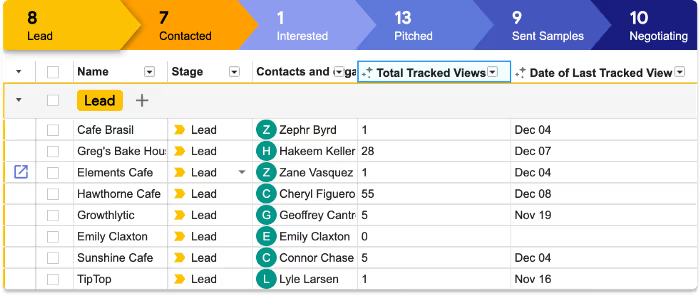
Its powerful email tracking can do wonders for your business. It lets you know when someone sees your messages and allows you to send personalized mass emails with mail merge.
They also make it easier to schedule emails, create a shared library of email snippets, and split conversations when topics branch.
The best part is that Streak directly integrates with G Suite, so you all your work stays in one place. Plus, you can integrate your workflow with over 1000 other tools through Zapier.
Try Streak for free for 14 days and see how much time and effort you can save automating repetitive tasks with its help. It only takes 30 seconds to get started.
Small businesses can definitely count on automation software to improve their marketing strategies. In fact, marketing automation platforms are especially useful for small businesses because it helps them save time and resources without spending too much money.
It depends on many factors: number of users, contact list, features, integrations, and the list goes on. The best part is that there are many excellent marketing automation platforms that can be used for free.
Yes, marketing automation really works. It helps marketing teams save time, generate and manage leads, personalize communication, craft campaigns, and evaluate strategies. Using a marketing automation tool is vital for the health and exponential growth of your business.
